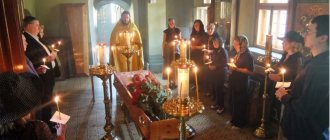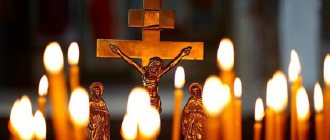Is there any point in praying for the dead?
The other day I held a funeral service for an elderly woman. After the funeral service, he addressed his relatives with parting words. He said, as usual in such cases, that God has everyone alive, that our goal is to achieve blessed unity with Him, and the only thing that prevents us from achieving this goal is our sins. And that, unfortunately, a person does not always manage to bear worthy fruits of repentance, so we need to pray hard for the forgiveness of the sins of our deceased relatives... And so that we can beneficially influence their afterlife, so that our prayers are heard, we must try to live in truth God, because there is a direct connection between our spiritual, moral state and the effectiveness of our prayer.
| Photo: Pravoslavie.Ru |
So I said all this, said goodbye to my relatives, went to the car, and then a woman came up to me and said: “Father!
You were talking there just now... But we cannot influence the afterlife of a person. As the Bible says, remember: “Brother cannot pray for brother”? I don’t remember such words and honestly admitted this, but at the same time I reminded that the Bible is a complete book and it is wrong to snatch some pieces from it out of context, without understanding for what reason, when, by whom and to whom it was said. However, the woman continued to talk about her own things. The fact that after death a person receives only what he deserves, and no prayers of loved ones can help or ease his fate. And she insisted precisely that the Bible says nothing about such an attitude towards the dead - that is, that there is a point in praying for them, that they can be helped somehow. I love such unexpected meetings, but, unfortunately, other people were already waiting for me, and there was no opportunity for us to talk in more detail. I just invited the woman to a conversation in the temple. There is, however, doubt whether she will come, although... and, of course, there is hope. What doesn't happen in life! The only thing that alarmed me was that there was something deliberate and stubborn in her words; It’s a pity that I didn’t have time to ask her if she belonged to another religion. Anyway.
So, does the Bible mention that praying for the dead has any meaning? And can prayers influence the afterlife fate of our loved ones? The questions are interesting and important. And I wanted to talk about this more thoroughly. Maybe the kind woman I met will read my writing, and our conversation will thus continue, and maybe she will come someday to a temple, if not mine, then another. In any case, I would really like this.
Let's start with this. What made me think about the heterodox origin of this woman’s reasoning? These are the words: “It’s not in the Bible.” This is a typically Protestant formulation of the question. But here's the thing. Despite all the exceptional importance of the Bible, this holy book does not exhaust the fullness of life, all its diversity, including the spiritual life of all humanity, various nations and each person individually. We can say that the Bible is an expression, an essential embodiment of this life. But the Bible is also part of this life. And everything that remains undescribed, everything that remains outside the written words - is this no longer life, not a covenant, not a continuation of the direct and living relationship between God and man?
It is also important to remember this. The Lord created the Church, in which our salvation takes place through incomprehensible ways, and it is the Church that, according to the words of the Apostle Paul, is “the pillar and ground of the truth” (1 Tim. 3:15). The Church is the body of Christ. That is, this is Christ Himself, living here and now, speaking to us, revealing His will to us, having mercy and saving... This is very important to understand. The Church is that very life that we can and must join, whose voice we must listen to, because its voice is the voice of God, His verb, eternally born and eternally addressed to us. Taking the Bible out of the context of the Church and trying to understand something in it is an activity, no matter how harsh it sounds, completely futile. The only positive outcome of such Bible reading or study can be that a person will come to Church and become an actual participant in the life of Christ. Then everything will fall into place, then the words of Scripture will acquire great transformative power for a person, they will become that “two-edged sword” that penetrates even to the separation of soul and spirit (Heb. 4:12).
In addition to the Holy Scriptures, in the Orthodox Church there is also the concept of Holy Tradition, that is, the concept of truth, which continues to enlighten us, teach us not only from the pages of the Bible, but also by the example of the life of holy people, their “word, life, love, spirit, faith, purity "(1 Tim. 4:12). Through the saints we are taught by the same Holy Spirit, by whom the Church was created and by whom the Church lives in all its catholic fullness.
“He who listens to you listens to Me, and he who rejects you rejects Me” (Luke 10:16), says the Lord to His disciples, and what the apostles said, what they taught, not everything, of course, was written down. Much has been and is still preserved with exceptional reverence and awe as Church Tradition. Over time, by the way, this Tradition, passed from mouth to mouth, was written down in books other than the New Testament. These are the messages of the closest disciples of the apostles, and then the disciples of their disciples, and so on... But one should not think that the truth passed on from mouth to mouth was inevitably distorted, as in a “broken telephone.” Such a distortion (inevitable in everyday affairs) is unthinkable in church affairs, and precisely in that part that relates to our salvation, because the Church is the truth, the Church is Christ Himself, the Church is supported and governed by His Spirit. This is important to understand: our human, sinful assessments and criteria are not applicable to the Church. All those iniquities and errors and disorganizations that we see, and even often, in the church fence, have nothing to do with the Church, with its essential content. And therefore it is important to understand that
in the Church belongs to its nature, the nature of Divine and indisputable truth, and what relates to human, sinful weakness and belongs, so to speak, to the borderline, “near-church” area. But in order to understand all this, you must, without a doubt, be inside the Church yourself, be a partaker of that Spirit of Christ by which the Church lives, moves, and exists.
The Church has always lived with the belief that the afterlife of people is not completely decided until the Last Judgment and that those living here on earth can, through their prayers, beneficially influence the afterlife of their relatives and friends. I repeat: this teaching has always existed, but it acquired effective force with the coming of the Savior into the world, thanks to His atoning sacrifice for our sins. And we will try, albeit very briefly, to trace the history of the attitude towards prayer for the dead in the Old Testament and New Testament Churches.
Although we know that before the Savior came into the world, the afterlife of all people, albeit to varying degrees, was still sad and desolate due to the complete dominion of sin over man, but in the Old Testament we also find examples of prayers of people living on earth , about the dead.
The most striking example of this is the prayer of the Jews for their brothers who died on the battlefield.
After the battle with the Edomites, under the tunics of the Jewish warriors who fell in battle, things dedicated to the Iamnite idols were discovered, captured as trophies. Since such an acquisition was clearly sinful, “it became clear to everyone for what reason they (the warriors) fell.” And then all the Jews turned to God in prayer, “asking that the sin committed would be completely blotted out.” Moreover, having made a collection from all those present, Judas Maccabee sent an offering to Jerusalem so that in the temple they “brought a sacrifice for the sin” of the dead, and, according to the word of Scripture, he “acted very well and piously, thinking about the resurrection ...” - that is, caring about forgiveness of your brothers on the day of the Last Judgment. “Therefore he offered a propitiatory sacrifice for the dead, that they might be freed from sin” (see: 2 Mac. 12: 39–45). The passage is completely comprehensive in order to understand that in Old Testament times there was a tradition of prayer and making sacrifices for the dead.
We can say that this tradition was of a prophetic, prophetic nature, because the real spiritual situation of the people of that time left them no hope of deliverance from the bonds of sin. This hope extended into the future and was associated with messianic expectations and forebodings.
Now about “brother will not beg for brother.” I’ll say right away that there are no such words in the Bible, but we can assume that the woman had in mind the following words from the Psalter: “A man will in no way redeem his brother or give God a ransom for him” (Ps. 49:8). Let's assume that these are the very words, then let's try to understand what their meaning is.
This psalm contains words of warning addressed to those living here on earth, so that they remember the terrible day of God’s judgment and do not rely on their wealth, strength and power, but try to spend the time of earthly life in repentance and purity. The main content of the verse is the reproof of the unrepentant. For on the day of the Last Judgment, no one will deliver us from the righteous judgment of God - not only a stranger, but even the closest one, such as a loving brother.
But let us note that here we are talking specifically about the Last Judgment, about the last, decisive word, while until this moment, according to the teachings of the holy fathers, there is still time for repentance of those living here on earth, and there is still time to propitiate the Lord and offering Him spiritual and material sacrifices for the departed.
Saint Basil the Great interprets this passage in the sense that all Old Testament people and even the prophets were bound by sin and, as bound, did not have the power to free anyone from mortal bonds, but when the Lord Jesus Christ appeared - a perfect Man and a perfect God - By His power He redeemed us from eternal death, and in His face we have hope and hope for salvation.
That is, the attitude towards the afterlife fate of the deceased in Old Testament times and the attitude towards their fate after the coming of the Savior into the world differ precisely in that the Lord, by His atoning sacrifice, acquired the power in the afterlife to change the fate of people from worse to better. We also know this from the event of Christ’s descent into hell, where He freed not only the righteous, but also repentant sinners from painful bonds.
There is no doubt that only the Lord can determine a person’s fate after death, and there is no doubt that this fate directly depends on the person’s way of faith and life here on earth. But there is also no doubt that it is possible and even necessary to pray for our family and friends, asking the Lord for forgiveness of their sins, and there is no doubt that these prayers are not in vain if we only try to listen to the Lord ourselves and live according to His commandments.
To sum it up, we can say this. Prayer for the departed, especially fervent prayer, filled with love and selflessness, is pleasing to God and, so to speak, inclines Him to mercy towards the one who prays and to the fulfillment of His request. We find much evidence of this in the New Testament. Thus, the Lord Himself says: “Whatever you ask in prayer with faith, you will receive” (Matthew 21:22). The Apostle James commands to “pray for one another,” without specifying anywhere that this applies only to those living here on earth. The Apostle Peter calls to “constantly love one another from a pure heart” (1 Pet. 1:22), also not limiting this love only to the relationships of earthly life. Moreover, it is “out of the abundance of the heart that the mouth speaks,” and the first expression of this fullness for a believer is prayer, including prayer for loved ones.
The main thing here is that the compassion, mercy and love shown by a person in prayer for the dead are pleasing to God and attract His grace, because these qualities - love, mercy and compassion - are the qualities of God Himself.
Actions for the benefit of the deceased are the oldest tradition of humanity
Neanderthals definitely already had the idea that a different life awaits a deceased fellow tribesman beyond the threshold of death. This is evidenced by the burials of those distant times: the dead were laid out as if they had fallen asleep, and nearby there were certainly stone household utensils and food for the road.
As academician A.I. wrote Okladnikov, a characteristic feature of the found skeletons of buried Neanderthals is their location with their heads to the east or west, and not to the south or north. Moreover, this pattern is observed everywhere: in Western Europe, in Crimea, in Palestine. This cannot be an accident and indicates a special attitude of the people of that era towards both the dead and death. It is likely that the Neanderthals had some kind of common religious cult.
The funeral service is a special rite, which, according to Christian doctrine, frees the deceased from earthly sins and directs his soul to eternal life.
Funeral service
Subsequently, the Cro-Magnons and pagan tribes had and developed their own ideas about the afterlife. However, they all proceeded from the fact that after death a person passes into another world, and the living must take certain actions for his benefit. Christianity, without departing from this natural and very ancient tradition, filled it with new, spiritual content.
Question and answer
What else, besides prayers, can you help the soul of the deceased?
Your own righteous life and good deeds. Saint John Chrysostom advises: “Almost dead through alms and acts of kindness: for alms serves to deliver one from eternal torment.”
On what dates and months do Trinity and Meat Saturdays fall?
These are moving dates. In 2020, Trinity Parental Saturday fell on June 6, and Ecumenical Meat Saturday was on February 22. In 2022, Trinity Saturday will be on June 19, and Meat Saturday will be on March 6.
Do all Christians pray for the dead?
No, Protestants deny the benefit and effectiveness of such prayers, citing the fact that the Bible contains no direct indications of their necessity. The one who surrendered himself to God during life and received the gift of grace, they believe, after death in any case will end up in His heavenly abode.











